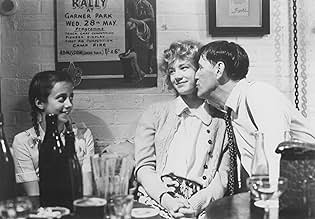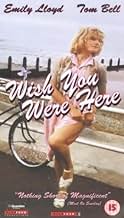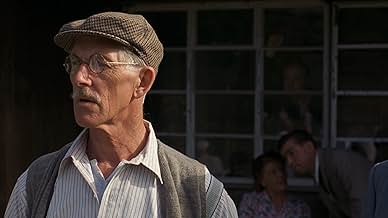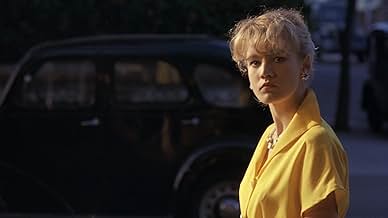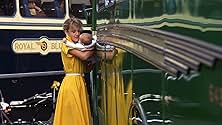NOTE IMDb
6,8/10
3,6 k
MA NOTE
Ajouter une intrigue dans votre langueIn a staid English seaside town after the Second World War, young Lynda grows up with her widowed father and younger sister. She eventually becomes pregnant by an acquaintance of her father.In a staid English seaside town after the Second World War, young Lynda grows up with her widowed father and younger sister. She eventually becomes pregnant by an acquaintance of her father.In a staid English seaside town after the Second World War, young Lynda grows up with her widowed father and younger sister. She eventually becomes pregnant by an acquaintance of her father.
- Victoire aux 1 BAFTA Award
- 6 victoires et 4 nominations au total
Susan Valentine
- Lynda's Mother
- (as Susan Skipper)
Avis à la une
Wish You Were Here is a delightful, moving and exceptional film for many reasons, but the most unusual is that it is one of two films written by David Leland (Mona Lisa) about a real person, the famous British madame, Cynthia Payne, which were both released in the same year--1987. (Both films claim to be fiction) Wish chronicles her youthful scandals; the other film,Terry Jones', Personal Services (1987) chronicles her adult scandals.
The two films are very different in style (this film being the more conventional of the two) but the character of Payne remains refreshingly the same. In Wish You Were Here the desperate pleading of a lonely young girl for love and affection takes a bizarre path helped by her rebellious and outspoken candid observations. It is her impatience with hypocrisy coupled with her desperate need that make this teenager so sympathetic. That, and her great sense of humor.
The colorful sex scenes filled with surprises keep the viewer disarmed, but mainly it is the main character's shining virtues of honesty, non-conformity, and defiance that makes this film a special one for young people. The scene with the therapist, matching dirty words, is one of the funniest on film, especially watching the marvelous way Emily Lloyd molds her reactions and then goes in for the kill. Emily Lloyd's career never lived up to this early brilliant performance, but her work here is so dazzling, it gives her a place in film history. Highly recommended for all teenagers who feel out of place and for adults who do, too.
Why hasn't this film moved to DVD? (only in England and Germany!) It's a rare find, and you may be both surprised and delighted!.
The two films are very different in style (this film being the more conventional of the two) but the character of Payne remains refreshingly the same. In Wish You Were Here the desperate pleading of a lonely young girl for love and affection takes a bizarre path helped by her rebellious and outspoken candid observations. It is her impatience with hypocrisy coupled with her desperate need that make this teenager so sympathetic. That, and her great sense of humor.
The colorful sex scenes filled with surprises keep the viewer disarmed, but mainly it is the main character's shining virtues of honesty, non-conformity, and defiance that makes this film a special one for young people. The scene with the therapist, matching dirty words, is one of the funniest on film, especially watching the marvelous way Emily Lloyd molds her reactions and then goes in for the kill. Emily Lloyd's career never lived up to this early brilliant performance, but her work here is so dazzling, it gives her a place in film history. Highly recommended for all teenagers who feel out of place and for adults who do, too.
Why hasn't this film moved to DVD? (only in England and Germany!) It's a rare find, and you may be both surprised and delighted!.
10zax-3
a beautiful film, very human, very funny...... faultless performances all round. Emily Lloyd is wonderful, this is a performance of real depth and adeptness. Wonderfully emotive and poignant whilst being funny. Where are you Emily?
Like most of the above reviewers say, this movie is a good film for a laugh and plenty of outrageous behaviour from the protagonist, Lynda. A terrific reproduction of 50s Britain - right down to the dressing gown patterns and minor consumer products. But what is it she really wants and what does she learn from her foolish behaviour? 'Nothing' seems to be the answer. And this 'nothing' seems to be the major theme. It is a film about folly.
In many ways Lynda's path is boringly predictable: She has no understanding of the man who manipulates her, nor of the future consequences of her rudeness and impulsive behaviour. One wonders what amount of social realism is represented here for an unmarried mother of the period. Poorly paid jobs, lack of support, a low income to further disable somebody with little patience and understanding of the situation she has largely created for herself. A fun attitude, temporary prettiness and her fast-disappearing youth will not go that far.
In many ways Lynda's path is boringly predictable: She has no understanding of the man who manipulates her, nor of the future consequences of her rudeness and impulsive behaviour. One wonders what amount of social realism is represented here for an unmarried mother of the period. Poorly paid jobs, lack of support, a low income to further disable somebody with little patience and understanding of the situation she has largely created for herself. A fun attitude, temporary prettiness and her fast-disappearing youth will not go that far.
With another actress in the lead, this film could have been another entry in the long, venerable line of British films about the misery of working-class life, a genre that stretches from "kitchen sink" classics like "Room at the Top" and "A Taste of Honey" (wonderfully ironic titles, of course) to such Mike Leigh bleakfests as "Meantime" and "All or Nothing." However, this film stars Emily Lloyd. Her character of Lynda seems written as a fragile, wounded creature driven to extreme behavior by emotional neglect (her mother died when she was young and her father is a stern, distant dope) and a rigid, oppressive social hierarchy (she suffers after being used and abandoned by a series of heartless men who are either older or wealthier than herself). As played by Emily Lloyd, however, Lynda is a joyful nymphomaniac who delights in offending people, kind of a "Happy Hooker Goes to Liverpool." Her outrageous behavior seems less a symptom of willful self-destructiveness than an animating demon impulse. In her dalliances with men, she seems to be seeking sexual satisfaction ("it's very nice, but is that all there is?") instead of love and security. Which makes her a distinctly post-feminist heroine out of "Sex and the City" instead of a victim of injustice out of a Theodore Dreiser novel. Which makes her completely out of sync with the rest of this gray, deterministic film. It doesn't help that Emily Lloyd, at least here, is so beautiful that she's literally luminous -- she seems to glow with a light that isn't shining on anything else in the film. Plus she's so vital and boisterous that we don't believe the circumstances which should be destroying her would even slow her down all that much. The key scene, which will either delight or disgust you, comes midway through the movie when lovely young Lynda takes a midnight stroll in her garden and ends up gamboling about, waking the neighbors (neighbours?) by screaming "up your BUUUUUUUUMMMMM!" at the top of her lungs. Is she a wounded soul begging for love and tolerance? A free spirit kicking against the pricks? A brat who needs to be spanked? Your answer to this question will determine your view of "Wish You Were Here."
This film is loosely based on the early life of Cynthia Payne, an infamous British prostitute and madam who has been the subject of other films. It was the debut for British actress Emily Lloyd, who played Linda aka Cynthia Payne. The film follows Linda's sexual awakening with flash backs to her younger childhood.
Linda is an unhappy child whose mother died when she was young and her father, raising her and her sister as a lone parent, struggles to manage her as she reaches adolescence. Her burgeoning sexuality is ill-fitting with the social mores of the seaside community in which she lives. Her sexual curiosity is innocent and defiant. This makes for much hilarity: in one scene she is taken to see a psychiatrist who asks her what rude words she knows in order to assess her sexual precociousness. Linda is well aware of the psychiatrist's intention and leads him a merry dance. In another she shows her legs and some of her underwear to fellow colleagues in a bus station. Yet there are times during her sexual development that are mundane and also sad. It is apparent that what Linda most wants is love and in particular is needy for love from her father, in the absence of her mother, but he never understands her enough to realise this.
The ending of the film, which I won't share in the review, is typical of Linda's character. She strides with pride and passion across a park and golfing course, yet she is young and vulnerable and somewhat foolhardy. The viewer admires her resolve, her fortitude and fears for her future.
The performances of all are superb. Emily Lloyd and Tom Bell deserve special mention. The plot is simple and effective and the characterisations credible. Although it is set in an England that has passed, the themes and meaning remain relevant for today's young women.
Linda is an unhappy child whose mother died when she was young and her father, raising her and her sister as a lone parent, struggles to manage her as she reaches adolescence. Her burgeoning sexuality is ill-fitting with the social mores of the seaside community in which she lives. Her sexual curiosity is innocent and defiant. This makes for much hilarity: in one scene she is taken to see a psychiatrist who asks her what rude words she knows in order to assess her sexual precociousness. Linda is well aware of the psychiatrist's intention and leads him a merry dance. In another she shows her legs and some of her underwear to fellow colleagues in a bus station. Yet there are times during her sexual development that are mundane and also sad. It is apparent that what Linda most wants is love and in particular is needy for love from her father, in the absence of her mother, but he never understands her enough to realise this.
The ending of the film, which I won't share in the review, is typical of Linda's character. She strides with pride and passion across a park and golfing course, yet she is young and vulnerable and somewhat foolhardy. The viewer admires her resolve, her fortitude and fears for her future.
The performances of all are superb. Emily Lloyd and Tom Bell deserve special mention. The plot is simple and effective and the characterisations credible. Although it is set in an England that has passed, the themes and meaning remain relevant for today's young women.
Le saviez-vous
- AnecdotesJust like Personal Services (1987), the previous movie from writer David Leland, this project was inspired by the real-life figure, Cynthia Payne. This movie focuses on her childhood growing up in Sussex while the other deals with her adulthood.
- GaffesThe U.S. flag on the bandstand during the dance has fifty stars. The U.S. flag in 1951 had only 48 stars.
- Citations
Lynda Mansell: Up your bum!
- Bandes originalesThe Robin's Return
(1898) (uncredited)
Music by Leander Fisher
Meilleurs choix
Connectez-vous pour évaluer et suivre la liste de favoris afin de recevoir des recommandations personnalisées
- How long is Wish You Were Here?Alimenté par Alexa
Détails
- Date de sortie
- Pays d’origine
- Langue
- Aussi connu sous le nom de
- Wish You Were Here
- Lieux de tournage
- Dome Cinema, Marine Parade, Worthing, West Sussex, Angleterre, Royaume-Uni(Lynda goes to live with Eric at the Dome Cinema)
- Sociétés de production
- Voir plus de crédits d'entreprise sur IMDbPro
Box-office
- Montant brut aux États-Unis et au Canada
- 3 283 832 $US
- Week-end de sortie aux États-Unis et au Canada
- 43 611 $US
- 26 juil. 1987
- Montant brut mondial
- 3 283 832 $US
Contribuer à cette page
Suggérer une modification ou ajouter du contenu manquant



